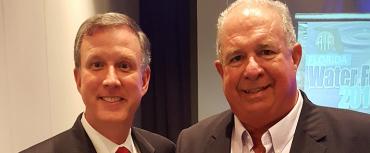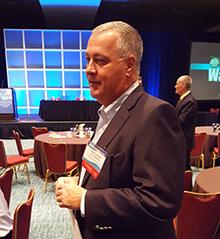
If you wanted a crash course in the biggest issue facing the state so far this century, there was no better place to be Thursday than the Florida Water Forum in Orlando.
Some 150 attendees heard panelists with a combined small fortune in Florida water history experience -- its management, its laws, its successes and failures.
As Herschel Vinyard, former secretary of the Department of Environmental Protection, put it, it's a matter of will. From here on out, he said, it's all about getting the Legislature to invest in the infrastructure Florida needs to deal with its wastewater and keep from running out of affordable, sustainable groundwater.
The amount of money, commitment and innovation it will take on all levels of government is daunting. The population is expected to rise another 4 million by 2030. Meanwhile, each region of the state has a different priority -- from polluted springs in the North to a groundwater shortage in Central Florida to saltwater intrusion in the Southwest, to wastewater and fertilizer pollution combined with saltwater intrusion in the South.
Florida Atlantic University scientist Brian Lapointe, who has studied the rivers, estuaries and bays for many Florida communities, called for a complete septic tank conversion to sewer systems, where wastewater can be treated and monitored.

Lapointe showed a video of the algal bloom-plagued lagoon and St. Lucie estuary, made in conjunction with the Florida Chamber of Commerce. He said his research showing human waste makes it clear: "Septic tanks aren't designed to keep pollutants out of waterways." With 600,000 septic tanks up and down the 157-mile Indian River, for example, "the lagoon can't take the load anymore ... you're going to have to pay to have a clean Indian River."
The Florida Agribusiness Council's Rich Budell, former director of the Office of Agricultural Water Policy, talked about the importance of Best Management Practices (BMPs) success achieved by Everglades Agricultural Area (EAA) farmers in cooperation with the South Florida Water Management District and other state agencies.
"You don't hear much about it but it's a classic success story," Budell said. "The strictest BMPs in the world are implemented right there in the Everglades EAA. Over 20 years, year after year, the phosphorus load has been reduced by 50 percent," he said. "All water conservation areas are improving and most meet the 10 parts per billion standard. This is a real testament to forward thinking policy, willing farmers and state application -- we're meeting water targets.
"North of the lake is a totally different story. We have 5,000 square miles of water draining into a 750-square-mile lake." Budell said range land can and is used for water storage. So is fallow citrus land. In fact, land north of the lake is ideal for creating deep wells to dispose of (polluted) stormwater. ..." An expensive process but the real answer, so that Lake Okeechobee can function as the reservoir it should be, holding a manageable amount of water.
"The numbers don't work to store our way out of this by moving the water south. In flood periods, in 12 to 15 days, you're going to fill everything up there. ... The Everglades are half the size they used to be but we have the same amount of water volume."
The Nature Conservancy's Greg Knecht ventured gently into a subject not covered in the program's agenda -- rising tides caused by climate change. "We need to look at the true cost of prevention instead of restoration later," he said. Knecht, director of protection for the Conservancy, discussed the importance of preserving agricultural land to aid drainage and slow flooding and mentioned ways to do it. "We also need to think about where the growth should go ... look at public-private partnerships. ..."
Before breaking into regional sessions, heady panels took up other issues on the Forum's first day, from water reuse to energy resources.
Associated Industries of Florida's Water Forum concludes today with the presentation of an award to House Speaker Steve Crisafulli; a 2017 Water and Environmental Appropriations Preview by Sen. Jack Latvala, R-Clearwater; an Amendment 1 panel; a Constitutional Revision Commission; and a discussion of emerging issues.
Reach Nancy Smith at nsmith@sunshinestatenews.com or at 228-282-2423. Twitter: @NancyLBSmith


